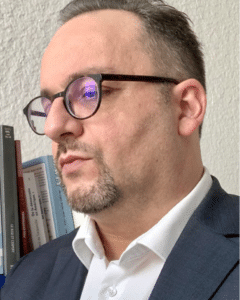There are countless programs, symposiums or articles dedicated to an alleged rise of suspicion towards science. What is your view ?
It is indeed a frequent theme. However, opinion polls show a more nuanced reality. When the question is more generic (“Do you trust researchers from public institutions to tell the truth about their research topics ?”), two thirds of respondents answer ‘yes’. Even though, in some cases, the outlook can be much darker – particularly with regards to medical topics1. Yet, the fact remains that, in general, there is more confidence in science than in politicians. I do not think however that there is a feeling of mistrust towards science across the board, so we need to examine each case carefully.
Tell us more !
I see two problems linked to the issue of mistrust.
The first is that it is a vague notion. We sometimes distinguish ‘mistrust’, a diffuse feeling, from ‘suspicion’, a structured attitude based on either good or bad reasons. The reasons for which should be investigated because there are other close notions with different implications ; ‘hesitation’, for example. It is widely studied in regard to vaccines, but it is not the same as mistrust or suspicion. I also think about ‘confusion’, which can have the same effects as suspicion, in terms of dismissal. However, it reflects the absence of reliable points of reference, or the difficulty to differentiate seemingly close realities. In the latter situation, the cacophony between the expertise of agencies and experts on TV shows for example has created a great deal of confusion. In a much broader sense, it is at the heart of the “infodemic” concept revived by the World Health Organisation (WHO) since February 2020.
A distinction is sometimes made between distrust, which is a diffuse attitude, and mistrust, which is an attitude structured by reasons.
The second problem is that objectifying this defiance, if it exists, and taking it for granted a little too fast, can have an effect on the democratic debate. What is the use of trying to convince people of the validity of a measure if a large part of the population is considered to be opposed to it as a matter of principle ? Last autumn, there was much talk about an important and relatively recent form of mistrust from French people towards vaccines. Even though at the time no Covid-19 vaccine was available yet, which made any declaration highly abstract. In addition, the beginning of the Covid-19 vaccination campaign showed a widespread desire to have access to vaccination as soon as possible (the hesitation towards the AstraZeneca vaccine being a separate case). In this particular case, the behavioural criterion – how will people concerned behave ? – seems more relevant to me than statements.
Some researchers speak of community phenomena. In other words, where scientists form part of an elite. As such, the working class can’t identify with them leading to mistrust towards them. What is your opinion ?
It should be clarified what is meant by “elite” here. Needless to say, the daily life of researchers is rather different than the lifestyle of business elites. Except in some particular cases, they are also detached from political decision-making : researchers and engineers are far from over-represented among political representatives and senators.
It seems to me that the problem is instead linked to how we perceive science. It corresponds to at least three realities. First, there is our knowledge of research, its conditions, what it’s like to be a researcher. This usually sparks interest, and some conferences, like the Science Festival (Fête de la science), or well-made popularisation videos, win over a wide audience.

Second, there is the individual or collective expertise, within an agency, a commission, an organisation, which is often misunderstood. Yet, generally it is a procedure that obeys very strict rules, can lead to balanced judgment, and even sometimes includes a plurality of views. It collides with the image of ‘experts’ seen on news channels, or even more generally, with the media image of those who feel entitled to give their opinion on other scientific disciplines or issues just because they are qualified in a particular field. This image of experts ‘in science’ does a lot of damage, and we have seen the emergence of many improvised epidemiologists these past few months !
Finally, there is the case when science is used to justify a political decision (“we follow science”, “science says…”). Criticism sometimes falls on science when it is in fact raised against politics. This last type of vision seems to fall under what we once called “the linear model”. Basically, only one policy stems from scientific conclusions, yet this is illusory. Even on subjects that are perfectly stable from the scientific point of view, whether in the field of energy, health or the environment, there is generally a plurality of scenarios. Decision-makers cannot hide behind researchers or experts, but they can unfortunately ignore them.
It is common that conspiracy theories have no scientific basis. Could their alleged increase be a sign of the growing mistrust in science ?
There is indeed cause for concern. For example, the documentary Hold up, which was viewed millions of times, mixes questions on the SARS-CoV‑2 virus with speculation on the reality of the outbreak, the global project named “the great reset”, not to mention 5G, and this can have a health impact. It is possible that social networks increase the visibility of this phenomenon. But, even when a conspiracy theory appears on a subject covered by scientific research as well, it is only part of the phenomenon. For instance, many of Donald Trump’s voters are still convinced that the result of the last election was a plot of the Democrats.
Even if there is a resurgence of conspiracy theories… they do not, or hardly ever, target research as such.
It seems to me that this last conspiracy theory has severe consequences, and it gives no statement on science. If we use the language of suspicion, such an attitude reflects a lack of trust in institutions, suspected of following a secret agenda. Conspiracy theories on scientific subjects are probably only one aspect of this general attitude, only in this case they target the particular institution that is science. Perhaps it is more striking because the idea that a scientific statement could be the result of a hidden agenda conflicts with the values of universality, truth and integrity presupposed by science. However, if you look in detail, to my knowledge, existing conspiracy theories focus more on the second and third images of science mentioned earlier. We hardly see any conspiracy theories on black matter or string theory, for example. All this would suggest that even if there is an increase in conspiracy theories, and even if we are rightfully concerned about some of their manifestations and we must address them when knowledge is threatened, they do not necessarily express defiance towards science nor target research itself.








